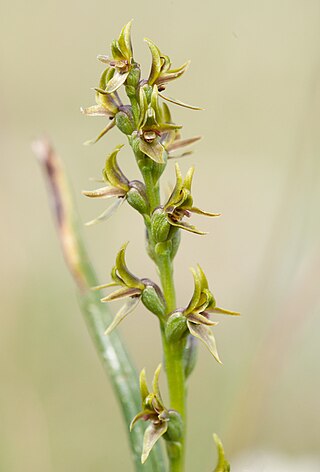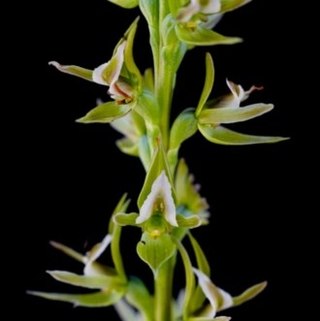
Prasophyllum tadgellianum, commonly known as the alpine leek orchid, is a species of orchid native to the Snowy Mountains and Tasmania. It has a single stiff, erect leaf and up to twenty scented, greenish-brown or reddish-brown flowers crowded on a stout spike.
Prasophyllum australe, commonly known as the southern leek orchid or austral leek orchid, is a species of orchid and is endemic to south-eastern Australia. It has a single tubular, green leaf and up to fifty scented, greenish-brown flowers with red stripes.

Prasophyllum montanum, commonly known as the mountain leek orchid, is a species of orchid endemic to eastern Australia. It has a single tubular, green leaf and up to fifty scented, greenish to pinkish flowers. It grows in montane ecosystems at altitudes above 1,500 m (5,000 ft).
Prasophyllum campestre, commonly known as the sandplain leek orchid, or inland leek orchid, is a species of orchid endemic to eastern Australia. It has a single tubular, yellowish-green leaf and up to twenty greenish, strongly scented flowers with red, purplish, brown or white marks. It grows in the drier parts of Queensland, New South Wales and Victoria.

Prasophyllum odoratum, commonly known as the fragrant leek orchid, Rogers scented leek orchid or sweet leek orchid is a species of orchid endemic to south-eastern Australia. It has a single tubular leaf and up to fifty fragrant green and white flowers with reddish marks.
Prasophyllum bagoense, commonly known as the Bago leek orchid, is a species of orchid endemic to a small area of southern New South Wales. It has a single tubular, green leaf and up to thirty scented, pale tawny green flowers on a flowering stem. It grows in subalpine grassland in a single population near Tumbarumba.

Prasophyllum dossenum is a species of orchid endemic to a small area of northern New South Wales. It has a single tubular, dark green leaf and up to thirty scented pinkish-white and greenish-brown flowers crowded along an erect flowering stem. It is a rare orchid which grows in grassy places on the Northern Tablelands of New South Wales.
Prasophyllum fecundum, commonly known as the self-pollinating leek orchid, is a species of orchid endemic to South Australia. It has a single, smooth, tube-shaped leaf with a reddish or purplish base, and up to twelve relatively small green and purplish flowers. The flowers are short-lived and self-pollinating although attractive to insects.

Prasophyllum fuscum, commonly known as the slaty leek orchid or tawny leek orchid, is a species of orchid endemic to a small region of New South Wales. It has a single tubular green leaf and up to thirty greenish brown to reddish brown flowers. There is debate about the taxonomy of the species with some authorities considering Prasophyllum uroglossum as a separate species. Only about twenty five plants are known to survive in south-western Sydney.
Prasophyllum litorale, commonly known as the coastal leek orchid, is a species of orchid endemic to southern continental Australia. It has a single tubular leaf and up to forty flowers with red and green colouring and grows in sandhills near the sea.
Prasophyllum parviflorum, commonly known as the slender leek orchid, is a species of orchid endemic to eastern Victoria. It has a single tubular leaf and up to thirty greenish-brown to purplish flowers. Further studies of the species may indicate that some collections currently included may be of a different species.
Prasophyllum pruinosum, commonly known as the plum leek orchid, is a species of orchid endemic to South Australia. It has a single tubular leaf and up to twenty green, brown and whitish flowers with a pink of purple tints.
Prasophyllum rogersii, commonly known as the Barrington Tops leek orchid is a species of orchid endemic to New South Wales. It has a single tubular leaf and up to twenty five reddish-brown flowers and only occurs in a few locations at higher altitudes.
Prasophyllum fitzgeraldii, commonly known as FitzGerald's leek orchid, is a species of orchid endemic to South Australia. It has a single tube-shaped leaf and up to thirty five green or reddish-brown flowers with a pink to purple labellum. It was previously thought to also occur in Victoria.
Prasophyllum catenemum is a species of orchid endemic to South Australia. It has a single tubular leaf and up to twenty white and green to purplish flowers. It is only known from a small area of the coast of the state where it grows in shrubland which is often engulfed by unstable sand dunes.
Prasophyllum collinum is a species of orchid endemic to South Australia. It has a single tubular leaf and up to thirty lemon-scented, greenish brown and white flowers. It is only known from the Eyre Peninsula where it grows in sparse woodland.

Prasophyllum basalticum is a species of orchid endemic to New South Wales. It has a single tubular, dark green leaf and up to fifteen scented, greenish-brown to brownish-red flowers with a white and green labellum. It grows in grassy woodland on the Northern Tablelands.
Prasophyllum brevisepalum is a species of orchid endemic to New South Wales. It has a single tubular, shiny dark green leaf and up to thirty five scented, yellowish to brownish green and white flowers. It is only known from a single population growing in woodland near Inverell.
Prasophyllum pictum is a species of orchid endemic to New South Wales. It has a single tubular, shiny dark green leaf and up to twenty two scented brown, pink, purple and white flowers. It is only known from three subpopulations on the Northern Tablelands.
Prasophyllum pilligaense is a species of orchid endemic to New South Wales. It has a single tubular, shiny dark green leaf and up to thirty scented greenish brown to brownish and white flowers. It is only known from a few populations in the Coonabarabran district.




